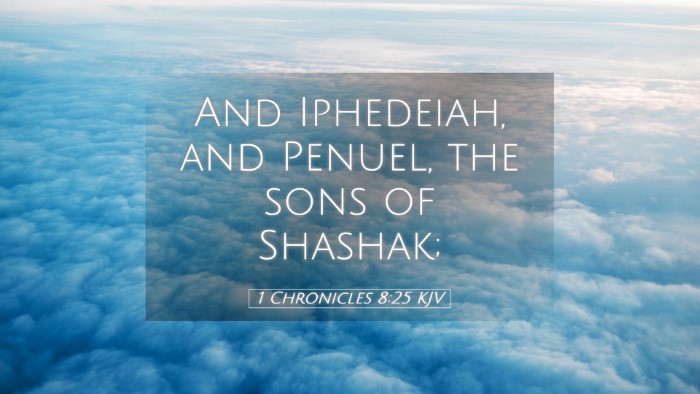Commentary on 1 Chronicles 8:25
Verse Context: 1 Chronicles 8:25 reads, "Ishbaal the son of Jonathan, the son of Saul, had a son named Meribaal, who was the father of Micah." This passage, while brief, is rich in historical and theological significance, extending deep into the history of Israel and the lineage of Saul's descendants.
Historical Context
The verse falls within the genealogical record of the tribe of Benjamin, particularly outlining the descendants of Saul, Israel's first king. The chronicler meticulously documents the lineage to demonstrate the continuity of God's plan through David and ultimately foreshadow Christ, who comes from the line of David.
Theological Insights
The reference to Ishbaal (also referred to as Ishbosheth) emphasizes the tension within Saul's lineage post-Saul's death. It reflects the political turmoil and fragmentation of Israel after Saul's reign. This turmoil led to the brief rule of Ishbaal before David was established as king, signifying the transition from the failed monarchy of Saul to the divinely appointed monarchy in David.
- Divine Sovereignty: Ishbaal's mention illustrates God's unending control over human history. Despite the chaos, God uses even the remnants of a failed dynasty to bring forth His salvific plan.
- Messianic Lineage: The mention of Meribaal, who is also known as Mephibosheth, is crucial for understanding the theme of grace in the Old Testament. His disability, being the son of Jonathan, highlights mercy and kindness in David's subsequent treatment of him (2 Samuel 9).
Commentary from Notable Scholars
Matthew Henry
Matthew Henry emphasizes the importance of keeping track of genealogies in Scripture as they provide clarity and understanding of God's covenantal promises. Henry notices how even with Saul's disobedience, the mention of his descendants indicates that God’s promises endure.
Albert Barnes
Albert Barnes elaborates on the significance of Meribaal’s lineage and connects it with God's faithfulness to His covenant with David. Barnes notes that Meribaal (Mephibosheth) represents the unfortunate remnants of Saul's house yet underscores David's loyalty and kindness, showcasing God's attributes through human relationships.
Adam Clarke
Adam Clarke addresses the transition in leadership from Ishbaal to David and discusses how the chaos following Saul’s reign paved the way for God's chosen king – David. Clarke highlights the nuances of the names used and underscores the historical implications concerning the civil and spiritual governance of Israel.
Practical Applications
For pastors, theologians, and students, this verse challenges us to consider how God uses imperfect circumstances to further His purposes. It teaches us about the importance of remembering our heritage and God’s ongoing covenantal faithfulness.
- Embracing the Kindness of God: Like David towards Mephibosheth, we are called to show mercy and kindness that reflect God’s character in our relationships.
- Understanding our Roots: Knowing our spiritual heritage can inform our faith journey and encourage us to recognize how God has been at work throughout history.
- The Role of Leadership: The transition from Ishbaal to David serves as a reminder of the importance of godly leadership and the impact it has on community and spiritual life.
Conclusion
1 Chronicles 8:25 serves as a succinct yet profound reminder of God's intricate plan woven through Israel's history. The passage lays a foundation for understanding the complexities of David's reign and the inclusive nature of God's grace extending even to the sons of Saul. In studying this verse, we are reminded of God's sovereignty and the significant role of mercy, heritage, and leadership in fulfilling His divine purposes.


